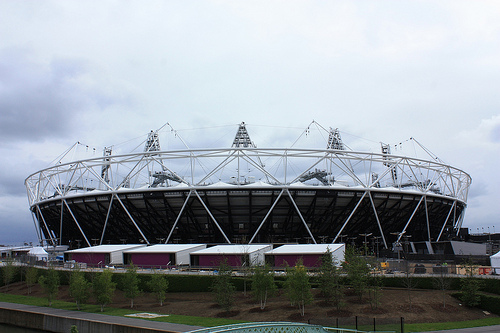One of the more talked-about elements of the opening Olympic ceremonies was the miniature procession of four athletes under the banner, "Independent Olympic Athletes." A lot of people were wondering, who are these independent athletes? And how do you compete without a country?
This is the third time that athletes have competed under the "independent" banner. The four athletes are from two locations: three of them are from the Netherland Antilles (Reginald De Wint: Judo, Liemarvin Bonevacia: 400m, Philipine van Aanholt: Sailing), and one is from South Sudan (Guor Marial: Marathon). In both cases, the athletes were left country-less for the Olympics basically due to bureaucratic issues.
Ordinarily, a country's National Olympic Committee is the governing body which chooses which athletes will be sent to the Olympics. Each National Olympic Committee is controlled by the International Olympic Committee, which is responsible for creating, blessing, and revoking NOC status.
The Netherland Antilles was dissolved in October of 2010. This Caribbean country consisted of five islands, which up until then had been governed under the auspices of the Kingdom of the Netherlands. The islands had never fully supported this arrangement, which was a holdover from colonial times. After the Netherland Antilles dissolved, three of the islands (Bonaire, Sint Eustatius, and Saba) became part of the Netherlands, while the other two islands (Curacao and Sint Maarten) became constituent countries of the Netherlands.
A minor political shuffle, in other words, but one which otherwise would have allowed three qualifying Olympic athletes to fall through the cracks for the 2012 Olympics. The Netherland Antilles Olympic Committee had planned to continue for the 2012 Olympics, but its status was revoked by the IOC in 2011. However, the IOC recognized that the three qualifying athletes could still be allowed to compete under the independent banner.
In the case of South Sudan, this country broke away from Sudan in June, 2011. It did not have time to form a National Olympic Committee, but marathon runner Guar Marial qualified for the finals, and the International Olympic Committee (IOC) allowed him to compete under the independent flag.
Marial's case is unique, in that the Sudan offered to allow him to compete under the Sudanese flag. However, Marial is a refugee from Sudan, who was kidnapped at the age of eight and forced into a labor camp during the civil war. 28 members of his family were killed in the war, but luckily Marial was able to escape. He fled to the United States, where he was granted residency (though not citizenship) as a war refugee.
Marial refused Sudan's offer, saying that "If I ran for Sudan, I would be betraying my people. I would be dishonoring the two million people who died for our freedom."
